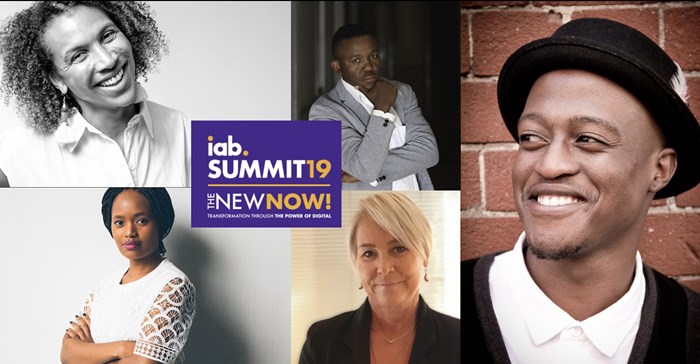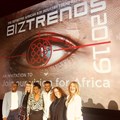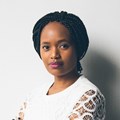#IABSummit19: Balancing the power of the new now

Bizcommunity's freelance journalist Danette Breitenbach will interview panellists Kalliebree Keynerd, head of social media at Joe Public Connect, Kirigo Kamore, content manager at McCann1886, Dali Tembo, CEO of Instant Grass International and Mongezi Mtati, MD at WordStart, discussing their views on the subject in their various areas of expertise.
Keynerd will share insights on online campaigns, drawing on her experience of implementing digital campaigns; Kamore will bring the perspective of content and how it needs to be approached online; Tembo will provide insight on the continent’s youth and their take on digital; and Mtati will give advice on how to create a buzz about your products/services and using influencers to do so.
“Transformation through the power of digital delivers an exponential set of advantages through the connectivity, scale and opportunity of the internet. Our expert panel members have an incredible depth of knowledge across these benefits in the media and marketing industry, as well as insights into how these benefits also positively impact us personally, as well as our communities, cities and countries. They are also highly aware of the potential pitfalls and red flags that are part and parcel of the territory, and in here lies the balance,” says IAB SA CEO Paula Hulley.
The discussion will address the pros and cons of digital and how it affects our personal lives and business. Breitenbach says, “Digital has given us online bullying and fake news, but it has also provided us with innovative solutions to many of the key challenges facing humankind, such as access to online money transfers and more humanitarian solutions, such as hunger and drought to name but two.
“We are all aware of the power of digital yet we are unsure of how to manage it – both in our private lives and work environment. Too often we are aware of the negative, for example, fake news, but not the positives, such as growing your business using digital tools. Any discussion on digital has to account for both sides of the coin.”
Hulley says being aware of the pros and cons of the power of digital is vital to succeeding in the ‘new now’. “Like all important matters, there are upsides and there are downsides – being aware of both gives you the power to better navigate this ever-changing journey and make the choices that deliver in context of the balance.”
Here, the panellists tell us why they’re looking forward to taking part in the panel and why this is an important conversation to have now…
Keynerd: I’m really interested in how this year’s format will play out. It’s nice to see the IAB Summit experimenting with a diverse mix of sessions and presentation formats from 30-minute deep dives, 15-minute technical demos to 5-minute snackable insights. Why are you looking forward to the IAB Summit and taking part in this panel in particular?
Why are you looking forward to the IAB Summit and taking part in this panel in particular?
Mtati: Digital has evolved so much in South Africa and across the continent that brands now need to understand the local audience much better than before, discussing some nuances that make South African digital communities will bring interesting changes and insights. Mostly, I look forward to learning how brands can engage better in the age of the death of organic reach.
Tembo: The more conversations we have about our individual experiences with how digital is fuelling transformation and facilitating impact, both personally and as business people functioning in this ever-evolving continental landscape, the better. In less than two decades, a piece of technology usually associated with wealthier continents (and high-income earners) has broken the trend curve and allowed millions of people access to information and resources that were previously unattainable. That said, we’re continuously discovering manifestations of this new found access that we never could have planned for. It is our duty to make sure we’re collaborating with other people (and communities) to share learnings and insights that might better prepare us for a future that’s already arrived.
Kamore: I’ve always wanted to go to the IAB Summit and be immersed in rich experiences and discussions around what’s happening in the industry. This event brings together people who are really invested in taking the industry forward in what is a fast-changing environment. For someone new to advertising, like me, the IAB has been somewhat of a north star, and so I’m thrilled to have the opportunity to meet with people in the industry and exchange ideas on how we can harness the opportunities and challenges we face in marketing today. Additionally, I’ve developed an interest in digital transformation, and so the theme of the panel really intrigued me. Understanding the pervasive power of digital and the implications that come with it is a big topic globally, as organisations try to grapple with how we can all balance this power in the new now. So, what better way to understand these implications than with a panel of thought leaders?
 Why do you believe you’re well positioned to comment on the subject/topics of discussion?
Why do you believe you’re well positioned to comment on the subject/topics of discussion?
Mtati: For the past 11 years I have sought to understand digital and social media with a leaning towards engaging better for brands in the local context, I believe some of the observations I have made may contribute towards a robust discussion on how digital can be utilised more effectively.
Keynerd: I’ve had a varied career in the digital space for the past decade and more. It is a field that I have a sustained passion for and have a good track record behind me.
Tembo: Digital has allowed us, as a South African born business formed in a small apartment in Green Point, to expand our networks and influence across 22 markets around the world. That kind of growth and development cannot be sustained without a clear and coherent understanding of the transformation digital has enabled within the context of the consumer landscape and delivering on great products, services and experiences. Over the last 15 years, many of the projects we’ve delivered have incorporated grassroots insights which detail how people (young people in particular) are: using digital, when they are using it, where they are using it and of course how digital trends are shifting our sense of reality. This has armed us with front row knowledge not only of how change is happening within our topic of discussion but also how it is being perceived - an important differentiator.
Kamore: I was surprised when I was asked to be part of the panel given that I’m still relatively new to advertising, though I’ve always worked in marketing. However, in the short span of my career, I’ve already witnessed the exponential changes in advertising driving an urgent need for new skills in the workforce. The old brand-centric rules of marketing taught in traditional institutions are now being eschewed for a new consumer-centric, digitally native approach. So, as a millennial at the crossroads of old and new marketing, this has become my new reality and one I’m fully committed to embracing.
 What about the subject is of most interest to you and why?
What about the subject is of most interest to you and why?
Mtati: With things pointing to less reach on social and brands owning their message more on owned platforms, I'm interested in discussing how this change will tilt the scales by platform. South Africans are now on social more than ever before and they tend to be engaging less with brands, I'm interested in hearing and seeing how we can communicate better.
Keynerd: What is the alternative to Facebook, WhatsApp and Instagram? Currently, these apps are merging and have in-depth access to our data, interests, habits, life stage and locations. However, more and more people are choosing to go off the grid, by removing themselves from the FB family of apps. What does this mean for marketers as our audience become more sophisticated about the use of their data?
Tembo: Reverse innovation – the idea that we (as part of the emerging markets) are now able to have more influence around the globe (and more produce more effective innovations) based on our access to technology and the internet. This is a fundamental change. We see this influence through the trends we’re able to export, the ideas we are able to share and most importantly (as far as I am concerned) how our culture can now be viewed through our own lenses - allowing us the ability to stand side by side with other cultures which may have been seen as ‘dominant’ in the past.
Kamore: As mentioned, I’ve developed a passion for digital transformation, as well as the 4th industrial revolution, not just within the context of advertising, but across industries and societies. I’m particularly interested in how we’ll address the need for digital literacy, a demand that is affecting both educated and uneducated people. We’re being taken ‘back to school’, so to speak, as well as being asked to change the airplane engine while in flight. While this seems daunting, I’m excited and optimistic about the changes we’ll see in our work and personal lives. As for advertising, I like that the power of digital is forcing us as an industry to me more accountable, transparent and consumer-centric. The bar is being raised in how we as a collective need to serve people more meaningfully.
 Why do you think this is an important discussion to have now?
Why do you think this is an important discussion to have now?
Mtati: Digital users have evolved and they continue to discussing how some recent changes can be used for both brand and human benefit critical as more and more people become connected.
Tembo: In simple terms, today’s world (and business in particular) has many challenges that require new solutions. These solutions require innovation. We have political systems that we have traditionally accepted that are under intense scrutiny. We have seen the collapse of banking infrastructure, the erosion of privacy, the impact of online bullying, the emergence of influencers, the evolution of a new multi-platform consumer etc., etc. Understanding the impact digital has had and how it is transforming culture is of pivotal importance if we are going to be in the driving seat and designing our own futures.
Kamore: Because this change is happening now. We’ve been talking about the ‘new now’ for a while, often referring to the threats and opportunities of digital transformation in the future tense. But today we’re finally at a point where we’re experiencing these changes in every aspect of our lives. This felt reality has at once been met with concern, ambivalence and excitement, but with little understanding of how we can leverage the power of digital in the private and public sector. So, I think the more we talk about this, the more we’ll have a better understanding of what we need to invest in to remain competitive and be well positioned to operate in an increasingly digital world. This is especially important in a continent that has been playing catch up in the previous three industrial revolutions.
 What do you hope to achieve through this discussion?
What do you hope to achieve through this discussion?
Mtati: We need to contextualise marketing in digital for various communities and to unpack insights behind some local communities, the idea of "best practices" is fading in favour of relevance for various niches and what it means for the user. Hyper customer-centricity is on the rise in digital and this is driven by nuances within various communities. I hope this discussion opens itself up to relevant local findings that can be used to connect better with various audiences by interest rather than demographic.
Keynerd: Growth and greater understanding of how others see digital transformation playing out in business and the country. My hope is to add value to the attendees and fellow marketing professionals out of my professional knowledge and experience.
Tembo: Personally, I hope to encourage the audience to engage in more of these debates outside of the conference setting and in our homes and businesses. Hopefully, there is a clearer understanding as to what digital transformation is and how it affects customer experiences and improves efficiency. If our biggest hurdle for the next 10 years is going to be unemployment, it is vital that we learn how to use technology to our benefit (particularly for SME's). These topics are no longer subjects pertaining to certain types of people. There are repercussions for all of us that stem from possible misunderstandings or not being informed. My hope is that we all leave better armed to make decisions that can contribute to a positive outcome for our country and continent.
Kamore: Better understanding and insights. I look forward to the diverse perspectives and experiences that will come out of the IAB Summit, as well as the proposed solutions from thought leaders in the industry. Ultimately I hope to learn how we can all balance the power of digital in the new now.
Don’t miss this panel on Thursday at 12pm to learn insights addressing the balance required to wield the power of digital. “It is time to understand the good, the bad and the ugly of digital so that we can utilise the platforms it offers responsibly and for the good of all,” concludes Breitenbach.
Book your ticket here or to learn more about the programme, event sponsors and the lineup of the day, visit the event website and remember, IAB members get a discount! The 5th Annual IAB Summit19 is brought to you by DStv Media, Accenture Interactive and partners: Newsclip, G-Star, Media 24, Tiso Black Star, Business Live, The South African, Spark Media, Adjoin, Social Lab and Bizcommunity.

About Jessica Tennant
Jess is Senior Editor: Marketing & Media at Bizcommunity.com. She is also a contributing writer. moc.ytinummoczib@swengnitekramRelated
IAB SA: 6 key trends impacting influencer marketing 1 day IAB South Africa 2025 Bookmark Awards names nine jury chairs 11 Mar 2025 IAB SA launches Bookmark Awards Masterclasses 21 Feb 2025 Join us for 2024’s last IAB SA Actionable Insights episode 27 Nov 2024 The biggest business news websites in South Africa 13 Nov 2024 SA's digital ad revenue hits new all-time high with almost 40% share of overall advertising market 24 Oct 2024



































